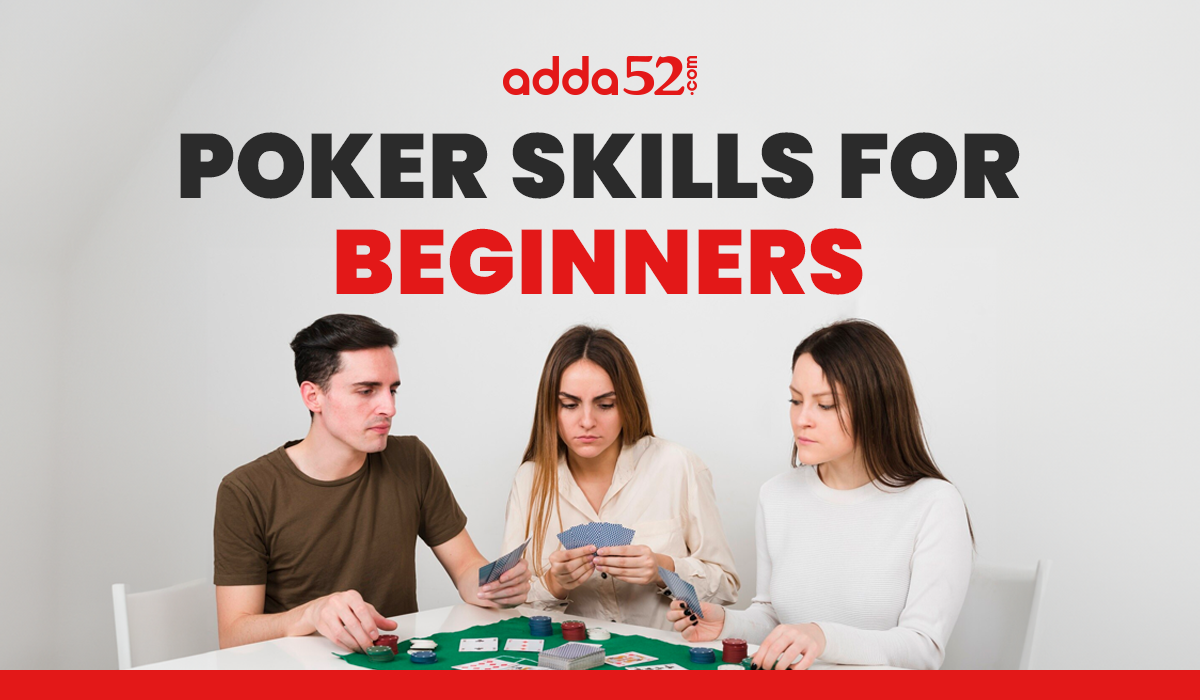Poker Skills for Beginners

Introduction
Poker is a combination of both skill and luck. While the outcome of each hand is determined by the cards that are dealt, players can use their knowledge, experience, and skills to increase their odds of winning. Playing poker starts with you having control over which cards to play and which to fold. You need the skill to guess what cards your opponents have and bet just the right amount to make them decide whether to call or fold.
In this article, we will discuss the various aspects of poker skills, including how much skill is involved in poker, an overview of poker skills, how to manage your finances, make decisions under pressure, deal with any situation, stay patient, stay focused, stay smart, make the most of the hand you are dealt, understanding risk versus rewards and learning to be more assertive.
Overview
Skill begins with a deep understanding of probabilities, enabling players to calculate their chances of winning based on the cards they hold and those on the table. Skilled players also possess the ability to read their opponents, interpreting betting patterns, body language, and other subtle cues to gain insight into the strength of their hands. The skillful poker players employ various strategies customised to the dynamics of the game and their opponents' tendencies, constantly adjusting their approach to maximise their edge. Effective bankroll management and a commitment to continuous learning distinguish skilled players from the rest. The more skilled you are, the better your chances of coming out ahead in the game. While luck may sway individual hands, it is mastery of skill that ultimately determines long-term success at the poker table.
What are Poker Skills
Some of the important Poker Skills are as follows:
-
Understanding the Rules:
You need to learn how to play the game. This includes knowing the different hands and their rankings, the order of play, and all the specific rules for the variant of poker you are playing.
-
Probability and Math:
You need to understand the chances of getting certain hands and the odds of your hand improving with each card dealt. This helps you decide whether to bet, call, raise, or fold.
-
Reading Opponents:
This involves observing your opponent's behaviour, betting patterns, and body language to try to figure out what kind of hand they might have. Good poker players can "read" their opponents and adjust their strategy accordingly.
-
Strategy and Tactics:
Poker is not just about the cards you are dealt, it is also about how you play them. This involves having a game plan or strategy for each hand and being able to adapt that strategy based on your situation. This includes knowing when to be conservative and when to be aggressive, as well as when to bluff.
-
Consistency
Consistency refers to playing reliably and steadily over time. Consistent players don't let wins or losses affect their judgement, which helps them stay focused and make better decisions in the long run. This skill is important because poker is a game of probabilities, and consistency helps the players maximise their chances of success over time.
-
Emotional Control:
Poker can be a game of highs and lows, and it is important to be able to keep your emotions in check. This means not letting excitement or frustration affect your judgement. Good poker players can stay calm and focused even when things are not going their way.
-
Bankroll Management:
Managing your money is a crucial part of being a successful poker player. This involves setting limits on how much you are willing to bet and being disciplined enough to stick to those limits. It also means knowing when to leave the game, if you are on a losing streak to avoid going broke.
Overall, poker skills encompass a combination of knowledge, strategy, observation, and emotional control. It is a game that rewards both intellect and discipline.
Managing Your Finances
Managing your finances means budgeting your money (also called your bankroll) wisely. It involves knowing how much you can afford to spend on buy-ins and making smart decisions to ensure you don't overspend or risk more than you can afford to lose. The players must manage their bankroll to avoid going broke. Managing your finances well is key to keeping you in the game for the long haul.
Making Decisions Under Pressure
Remember not to make decisions under pressure because you might make mistakes in reading your opponents, which may end up hampering your game. Players constantly need to make the right decisions and strategize their game plan according to distinct situations. There are probabilities of difficult situations where the players are required to play back-to-back hands which requires smart and strategic decision-making. The players must learn to make decisions accurately under pressure and try to make it their strength.
Patience
Patience in poker is like waiting for the right moment to strike. It means resisting the urge to play every hand, instead waiting for favourable situations, and the right moment to make your move. Staying patient and knowing when to act is important to win. A patient poker player waits for the right cards and the right circumstances to maximise their chances of winning. Being patient helps you stay calm, focused, and ready to pounce when the time is right.
Study Smart
Studying smart means finding the best way to learn and improve your game. This includes reviewing hand histories, watching instructional videos, reading poker books, or discussing hands with fellow players. It involves focusing on the important aspects of poker, including strategy and probabilities. By focusing on specific areas where you can improve and actively seeking out valuable insights, you can accelerate your learning and make better decisions at the table. Studying smart is the skill of discovering the most efficient route to becoming a better player.
Dealing With Any Situation
Dealing with any situation is being prepared for anything that comes your way. It means honing the skills to handle diverse situations at the table, whether you are facing aggressive opponents, a string of bad luck, or unexpected challenges. A Skilled poker player adapts their strategies to navigate through various situations regardless of the circumstances. Mastering the ability to deal with any situation is like having a reliable compass that guides you through the ups and downs of the game.
Reading And Understanding People
Reading and understanding people means being able to guess what others are thinking based on their actions and behaviour. It involves paying close attention to their body language, facial expressions, and betting patterns to figure out if they are confident, nervous, or bluffing. The players should analyse their opponents to make informed decisions and gain an advantage at the table. Mastering this skill is unlocking the ability to see through the cards and predict your opponents' moves.
Making The Most Of The Hand You Are Dealt
It is a fundamental skill that involves strategically leveraging the cards that you have to maximise your chances of winning the hand. It means using the cards to your advantage, even if they are not the best ones. It involves making smart decisions, like betting when you have a strong hand or folding when you have a weak one. It is crucial to assess the strength of your cards relative to the game being played and understand the odds of improving your hand. Seizing opportunities that arise during the hand, such as successful bluffs or favourable community cards, is important to pay attention to.
Understanding Risk vs. Reward
It involves evaluating the potential gains against the likelihood of losing. If you risk a lot, the potential reward can be big, but there is also a higher chance of losing. On the other hand, playing it safe might not win you as much, but you are less likely to lose big. Playing conservatively involves minimising risks to safeguard your chips. Skilled poker players know how to balance these risks and rewards to make smart decisions during a game.
Learning To Be More Assertive
Learning to be more assertive is gaining confidence in speaking up for yourself. It means being bold and decisive in your actions at the table, whether it is raising bets, calling, or folding. Being assertive empowers the players to assert their position and take control of the game. Developing assertiveness is unlocking a key trait that strengthens your play and maximises your chances of winning.
Improving Your Focus
It is important to stay focused throughout the game. Improving your focus involves training your mind to remain completely engaged in the game without getting distracted. The players must cultivate a focus to make informed decisions and capitalise on strategic opportunities. Enhancing focus is levelling up your game leading to heightened performance and success at the table.
Frequently Asked Questions
Is Poker gambling or a game of skill?
Luck plays a part in the short term, but skillful players can consistently win in the long run by making strategic decisions based on probabilities. While luck can sway individual hands, skill ultimately determines success over time.
Is Poker a game of skill?
Poker is primarily a game of skill. While luck influences short-term outcomes, skillful players consistently outperform less experienced opponents through strategic decision-making, reading opponents, and managing risk.
How much skill is involved in Poker?
Skill is crucial in poker for long-term success. Mastering the game involves learning various strategies, reading opponents, and managing emotions to maintain focus. A skillful play ultimately determines who wins in the end.
How to improve Poker Skills?
Refining your tactics, adapting to different situations, and a commitment to continuous learning are important to improve your poker skills. Learn poker strategies from books, videos, or experienced players to gain insights. Practise regularly and analyse past games for mistakes.
Conclusion
Poker is a combination of skill and luck. While luck influences individual hands, skillful players can tilt the odds in their favour by consistently succeeding in the long run through strategic decision-making, reading opponents, and managing risk. To excel, players must understand probabilities, master various strategies, stay disciplined, stay patient, and continuously learn on the Adda52 platform.
